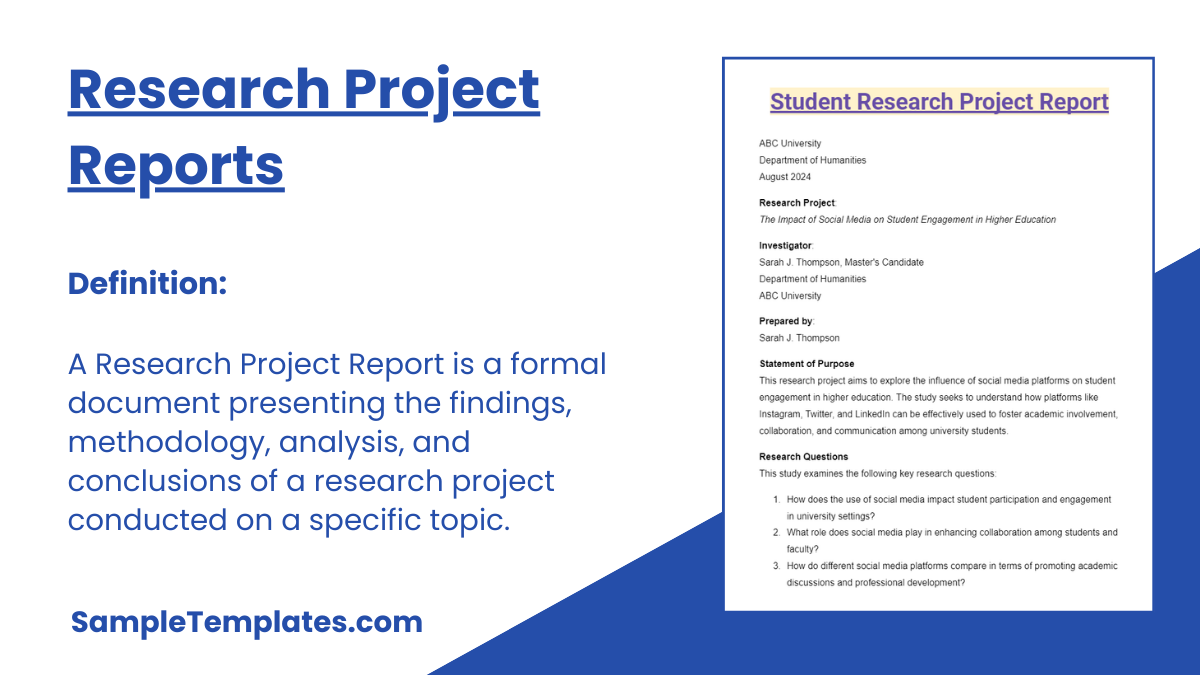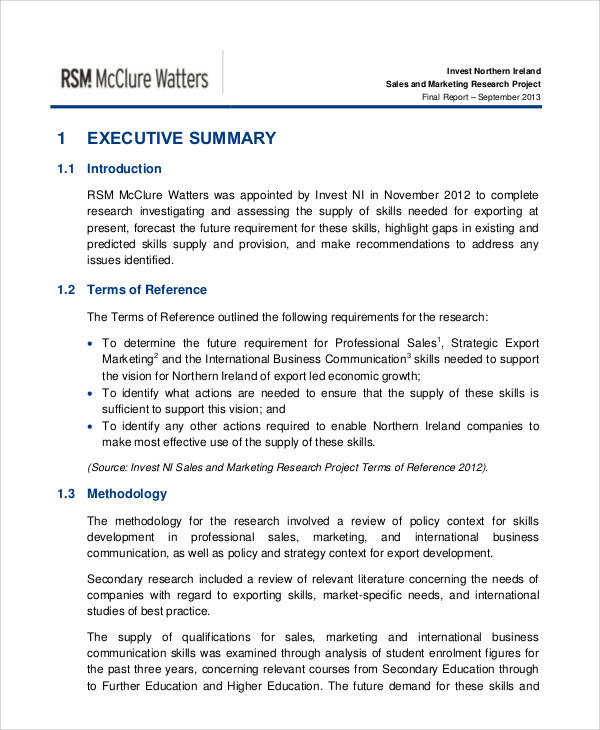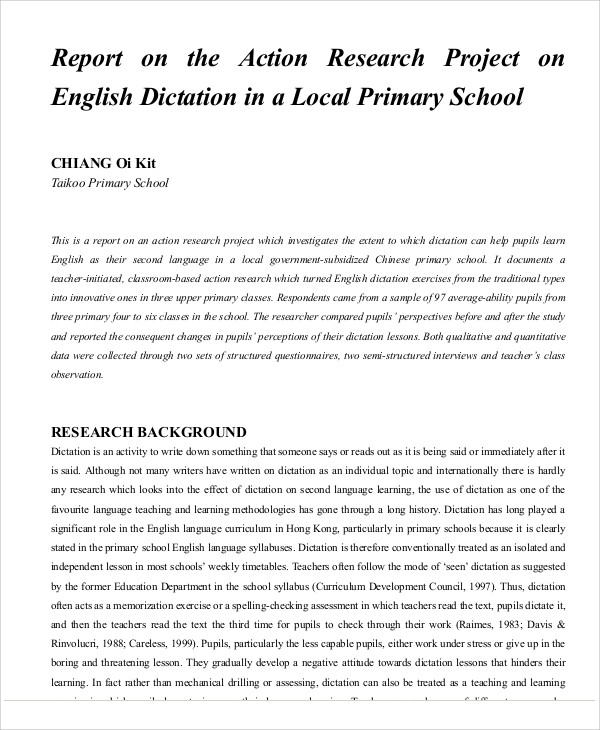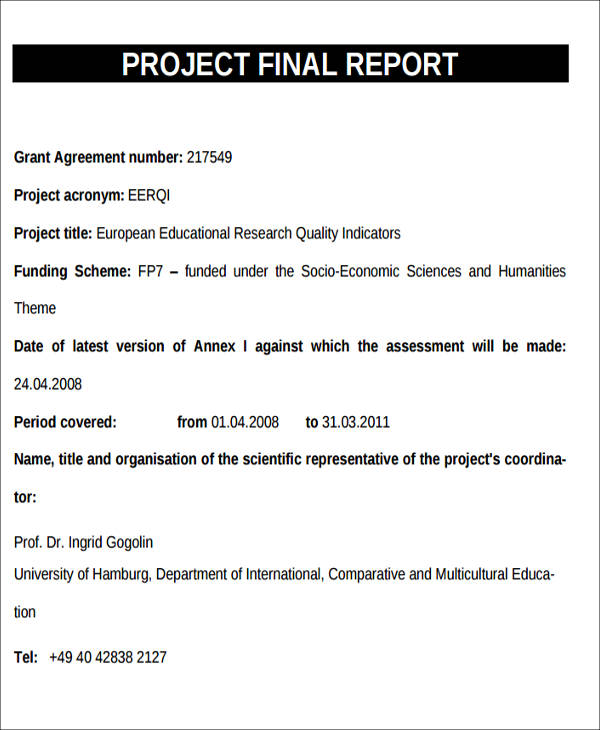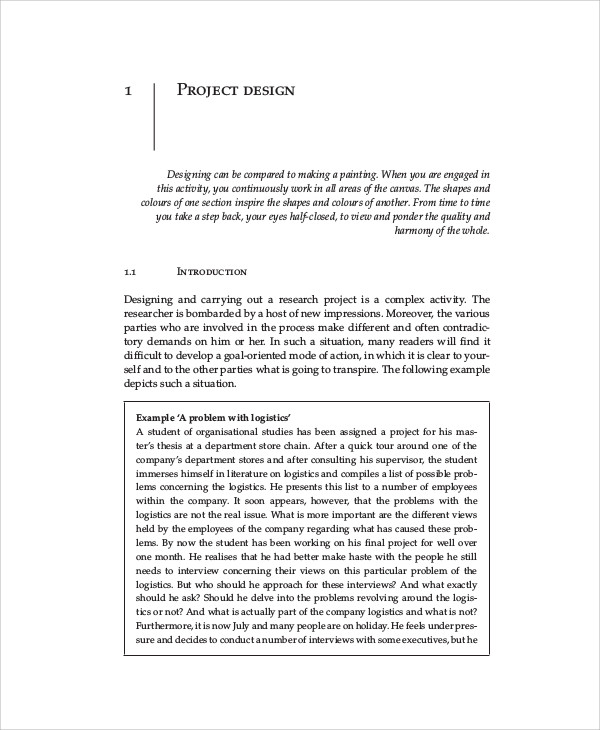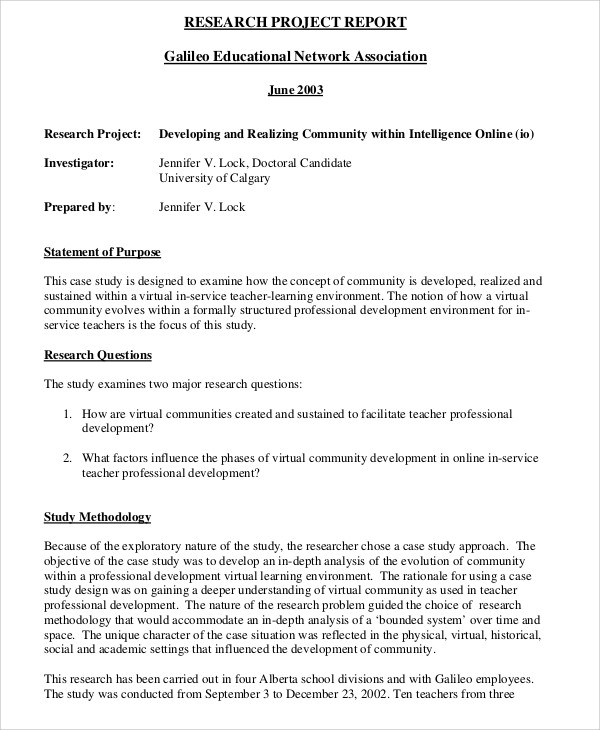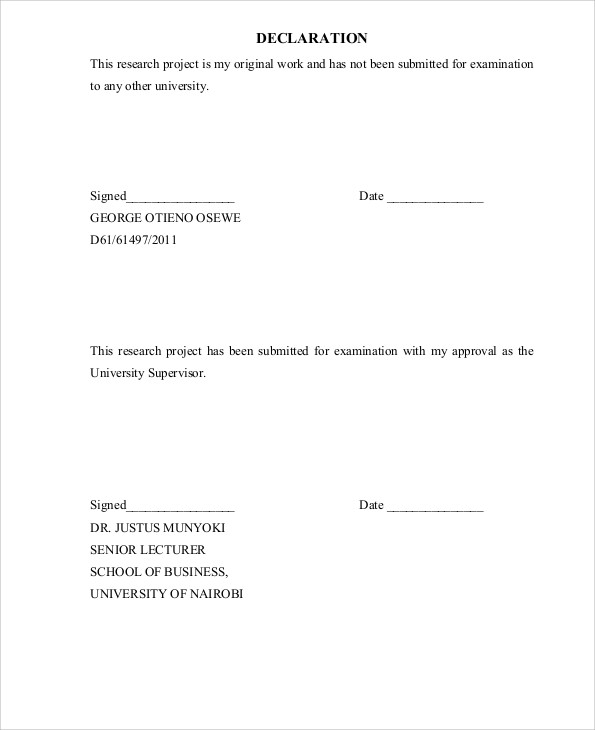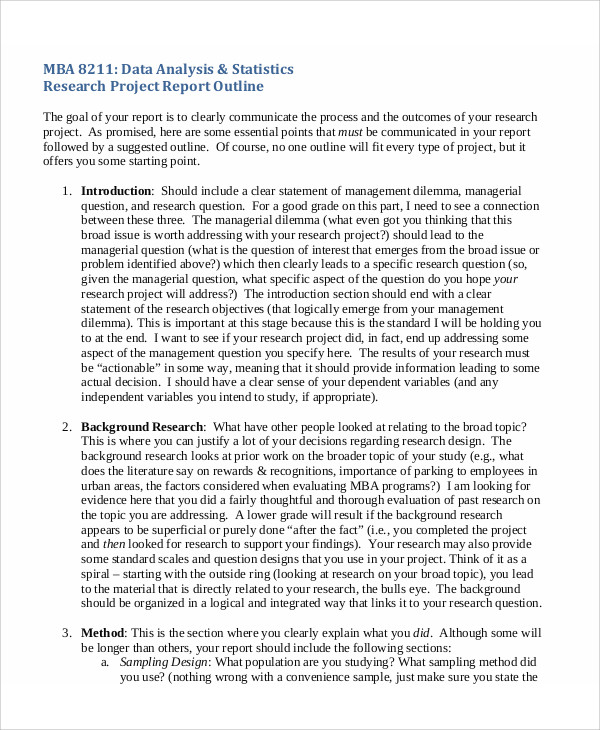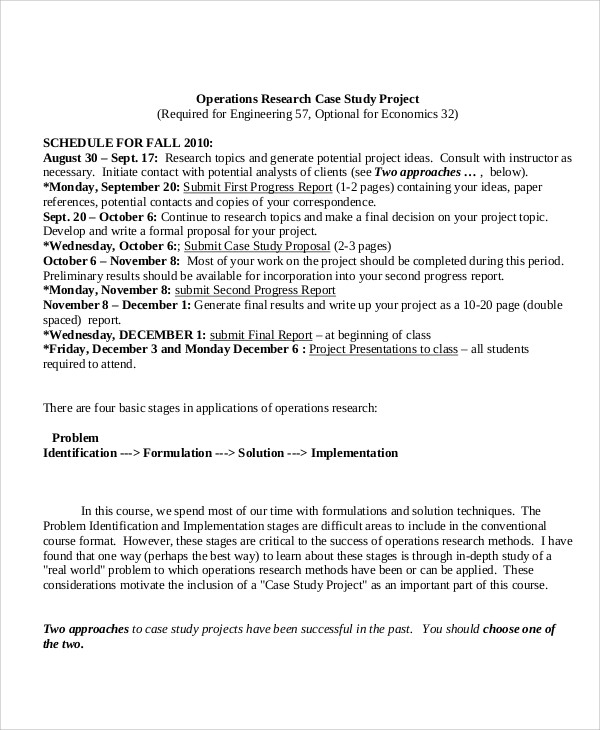Working on a research project involves keeping track of the work you put into it. Naturally, you would want to make certain that your time and effort will not be rendered futile. Creating a project report that covers the time frame of a phase of your research will prove to be beneficial as you will be able to monitor progress, as well as identify and address setbacks promptly.
It will help to browse Sample Reports for you to get a good idea of how to make a project report. You will know what specific format to follow and also how you can organize the content of your report.
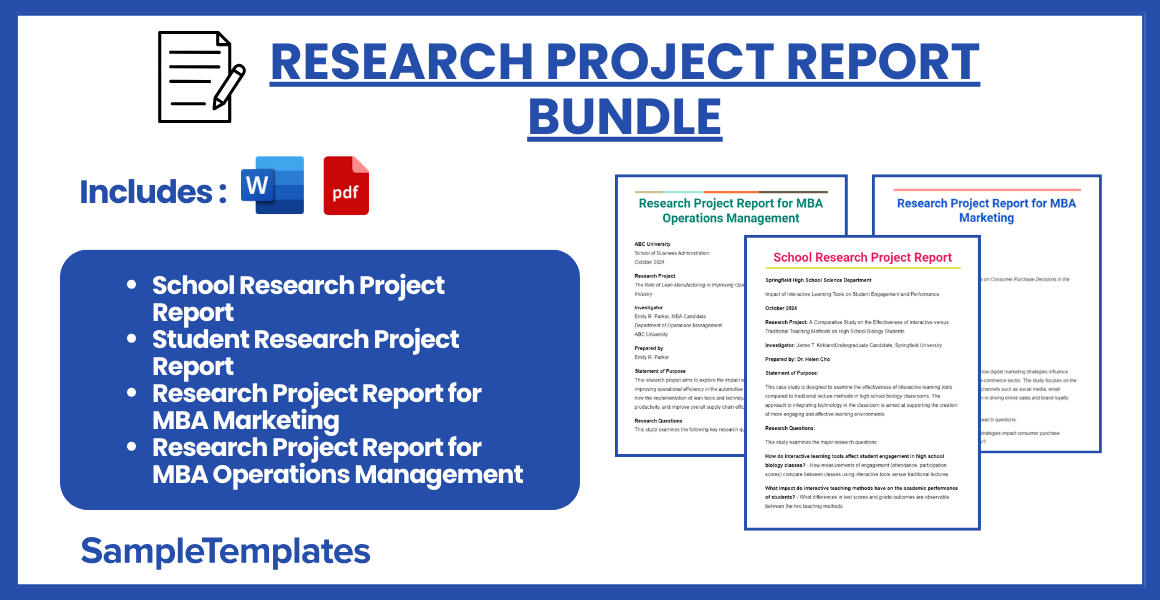
Download Research Project Report Bundle
School Research Project Report
Springfield High School Science Department
Impact of Interactive Learning Tools on Student Engagement and Performance
October 2024
Research Project: A Comparative Study on the Effectiveness of Interactive versus Traditional Teaching Methods on High School Biology Students
Investigator: Jamie T. KirklandUndergraduate Candidate, Springfield University
Prepared by: Dr. Helen Cho
Statement of Purpose:
This case study is designed to examine the effectiveness of interactive learning tools compared to traditional lecture methods in high school biology classrooms. The approach to integrating technology in the classroom is aimed at supporting the creation of more engaging and effective learning environments.
Research Questions:
This study examines the major research questions:
- How do interactive learning tools affect student engagement in high school biology classes? – How measurements of engagement (attendance, participation scores) compare between classes using interactive tools versus traditional lectures.
- What impact do interactive teaching methods have on the academic performance of students? – What differences in test scores and grade outcomes are observable between the two teaching methods.
- Which aspects of interactive learning are most appreciated by students? – Which features (multimedia, real-time feedback, collaborative tools) are highlighted by students as most beneficial.
Study Methodology:
This quantitative exploratory study seeks to understand the direct impacts of teaching methods on student outcomes. The study encompasses surveys, performance data analysis, and classroom observation, aimed to provide a comprehensive overview of learning effectiveness.
Conclusion:
The findings of this study indicate that classes equipped with interactive learning tools showed significantly higher engagement and better performance scores compared to traditional lecture-based classes. These insights are essential for educators and school administrators looking to optimize teaching strategies and improve student learning outcomes. Further studies could explore the long-term effects of interactive learning on student academic careers
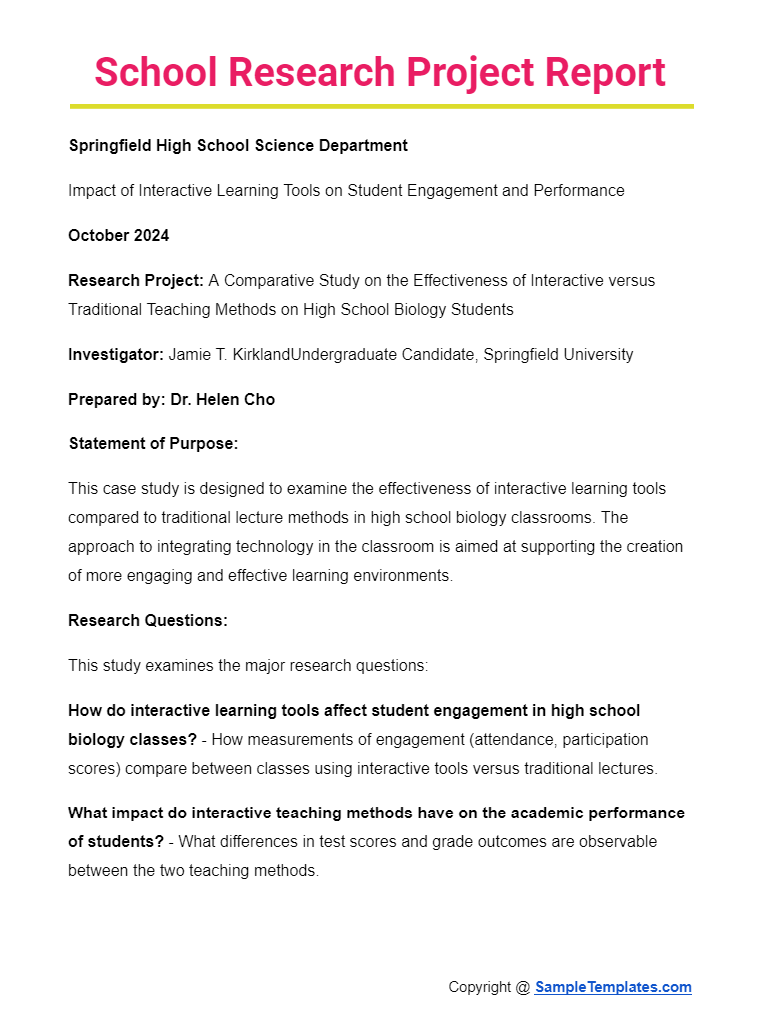
Student Research Project Report
ABC University
Department of Humanities
August 2024
Research Project:
The Impact of Social Media on Student Engagement in Higher Education
Investigator:
Sarah J. Thompson, Master’s Candidate
Department of Humanities
ABC University
Prepared by:
Sarah J. Thompson
Statement of Purpose
This research project aims to explore the influence of social media platforms on student engagement in higher education. The study seeks to understand how platforms like Instagram, Twitter, and LinkedIn can be effectively used to foster academic involvement, collaboration, and communication among university students.
Research Questions
This study examines the following key research questions:
- How does the use of social media impact student participation and engagement in university settings?
- What role does social media play in enhancing collaboration among students and faculty?
- How do different social media platforms compare in terms of promoting academic discussions and professional development?
Study Methodology
To address these research questions, a mixed-method approach was utilized. The study incorporated both qualitative and quantitative data collection methods. A survey was distributed to 200 undergraduate and graduate students to measure their frequency of social media usage and its perceived impact on their academic engagement. Additionally, in-depth interviews were conducted with 10 faculty members to gain insights into their experiences and views on integrating social media into the academic environment.
A collaborative element was included in this study, with students and faculty participating in a focus group to discuss potential improvements in the use of social media for educational purposes. The case study approach was chosen due to its flexibility and relevance to understanding the nuances of student-faculty interaction through digital platforms.
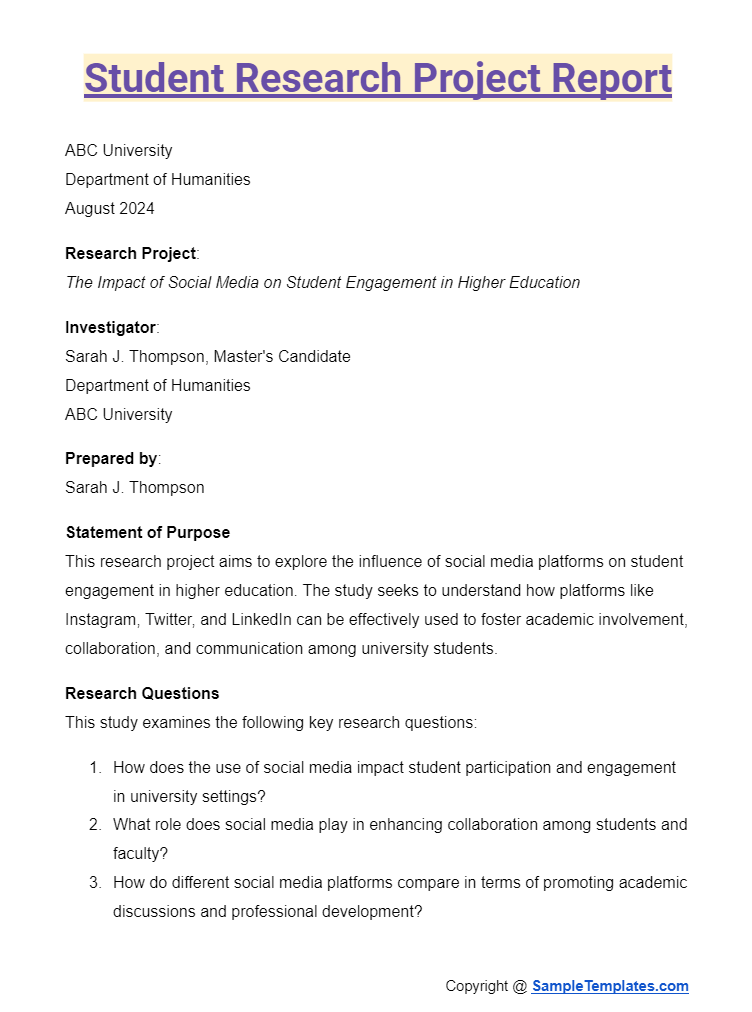
Research Project Report for MBA Marketing
XYZ University
School of Business Administration
September 2024
Research Project:
The Impact of Digital Marketing Strategies on Consumer Purchase Decisions in the E-commerce Sector
Investigator:
John D. Anderson, MBA Candidate
Department of Marketing
XYZ University
Prepared by:
John D. Anderson
Statement of Purpose
This research project aims to investigate how digital marketing strategies influence consumer purchase decisions within the e-commerce sector. The study focuses on the effectiveness of various digital marketing channels such as social media, email marketing, and search engine optimization in driving online sales and brand loyalty.
Research Questions
This study examines the following key research questions:
- How do different digital marketing strategies impact consumer purchase decisions in the e-commerce sector?
- What role does social media marketing play in building brand loyalty among online consumers?
- How effective are email marketing campaigns in converting leads into customers compared to other digital strategies?
Study Methodology
This study used a quantitative research design to measure the impact of digital marketing strategies on consumer behavior. Data was collected through an online survey of 300 consumers who regularly shop on e-commerce platforms. The survey included questions on consumer preferences, the effectiveness of digital marketing techniques, and the frequency of online purchases.
Additionally, a focus group consisting of 10 marketing professionals from leading e-commerce companies was conducted to provide insights into current digital marketing practices and their effectiveness in increasing conversion rates. The study also analyzed case studies from successful digital marketing campaigns in the retail sector to highlight best practices.
The research approach aimed to provide a comprehensive understanding of how digital marketing tools and techniques can enhance consumer engagement and drive online sales in the competitive e-commerce industry
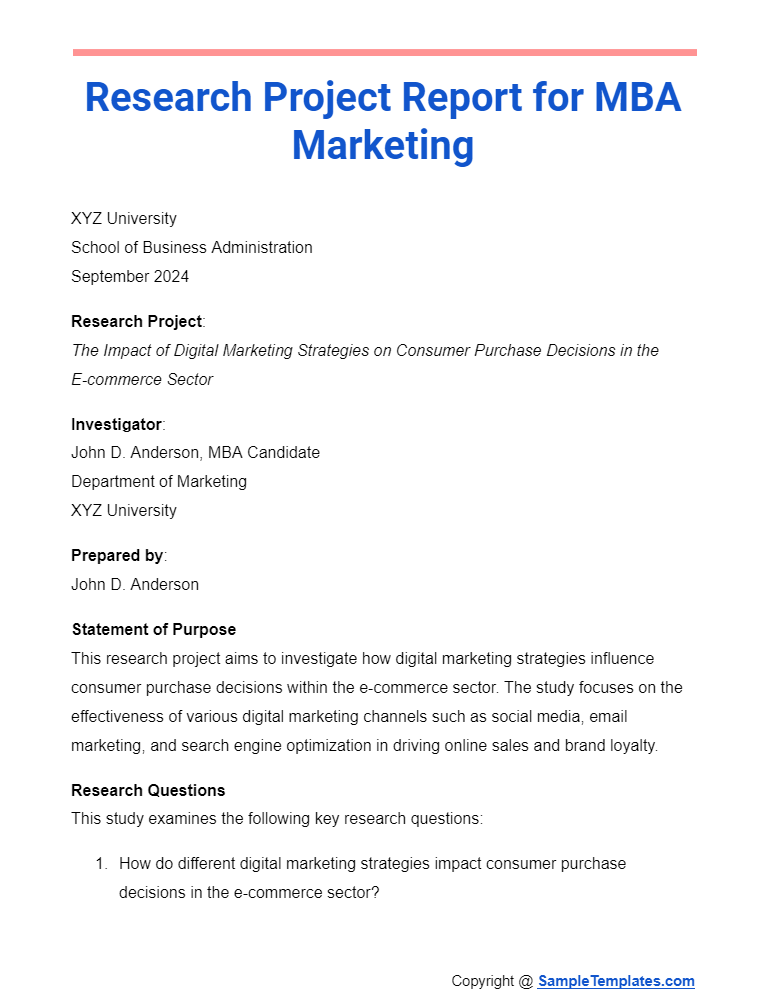
Research Project Report for MBA Operations Management
ABC University
School of Business Administration
October 2024
Research Project:
The Role of Lean Manufacturing in Improving Operational Efficiency in the Automotive Industry
Investigator:
Emily R. Parker, MBA Candidate
Department of Operations Management
ABC University
Prepared by:
Emily R. Parker
Statement of Purpose
This research project aims to explore the impact of Lean Manufacturing principles on improving operational efficiency in the automotive industry. The study seeks to evaluate how the implementation of lean tools and techniques can reduce waste, enhance productivity, and improve overall supply chain efficiency.
Research Questions
This study examines the following key research questions:
- How does the implementation of Lean Manufacturing principles affect operational efficiency in the automotive sector?
- What are the main challenges faced by automotive companies in adopting Lean Manufacturing?
- How does the reduction of waste through Lean practices contribute to cost savings and increased productivity in automotive manufacturing?
Study Methodology
This research adopted a case study approach to evaluate the effects of Lean Manufacturing in three major automotive manufacturing companies. Quantitative data was gathered through key performance indicators (KPIs) related to operational efficiency, such as production cycle times, inventory levels, and defect rates.
Additionally, interviews with operations managers and lean specialists were conducted to gain insights into the practical challenges and benefits of implementing Lean Manufacturing. This study also conducted a detailed analysis of specific lean tools, including Kaizen, 5S, and Just-in-Time (JIT), to assess their individual contributions to operational performance improvements.
The data collected were analyzed to identify common trends and best practices that can be applied across the industry to improve supply chain performance and operational efficiency
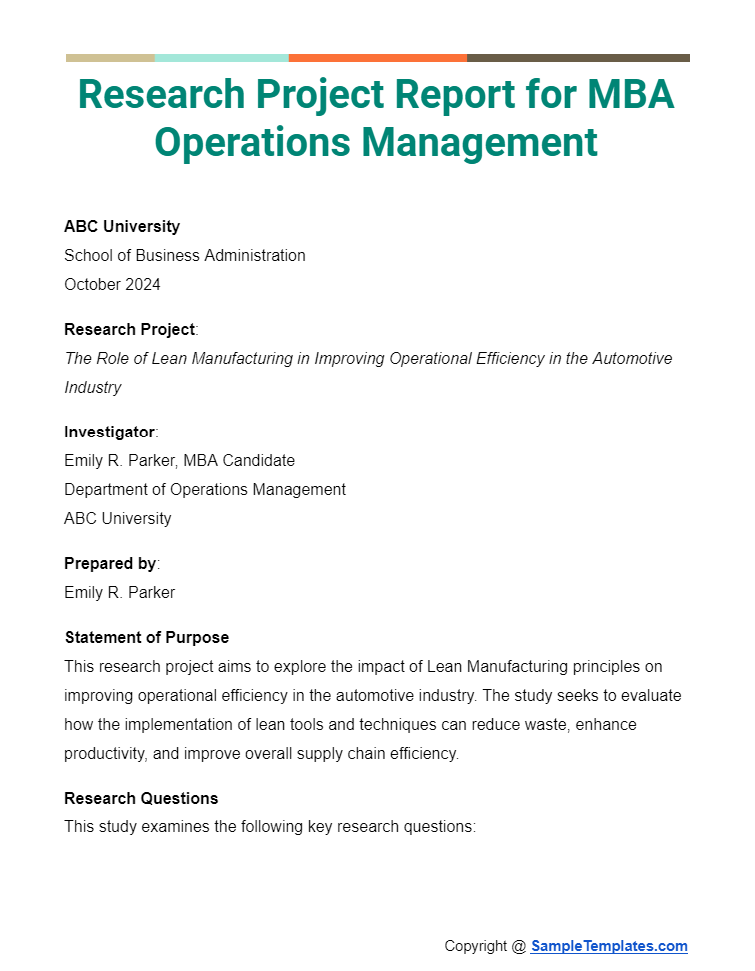
Browse More Templates On Research Project Reports
Project Status Report Template
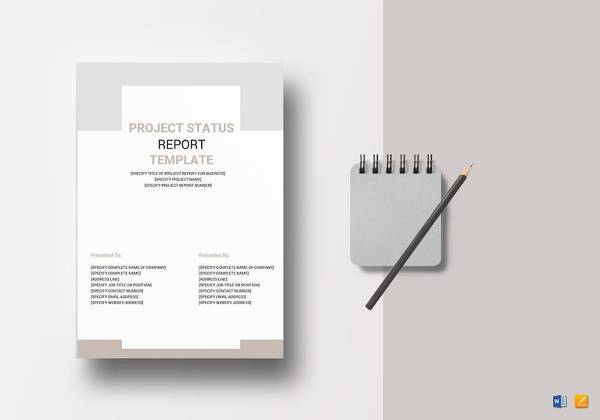
Market Research Project Report
Action Research Project Report
How to Write a Research Project Report?
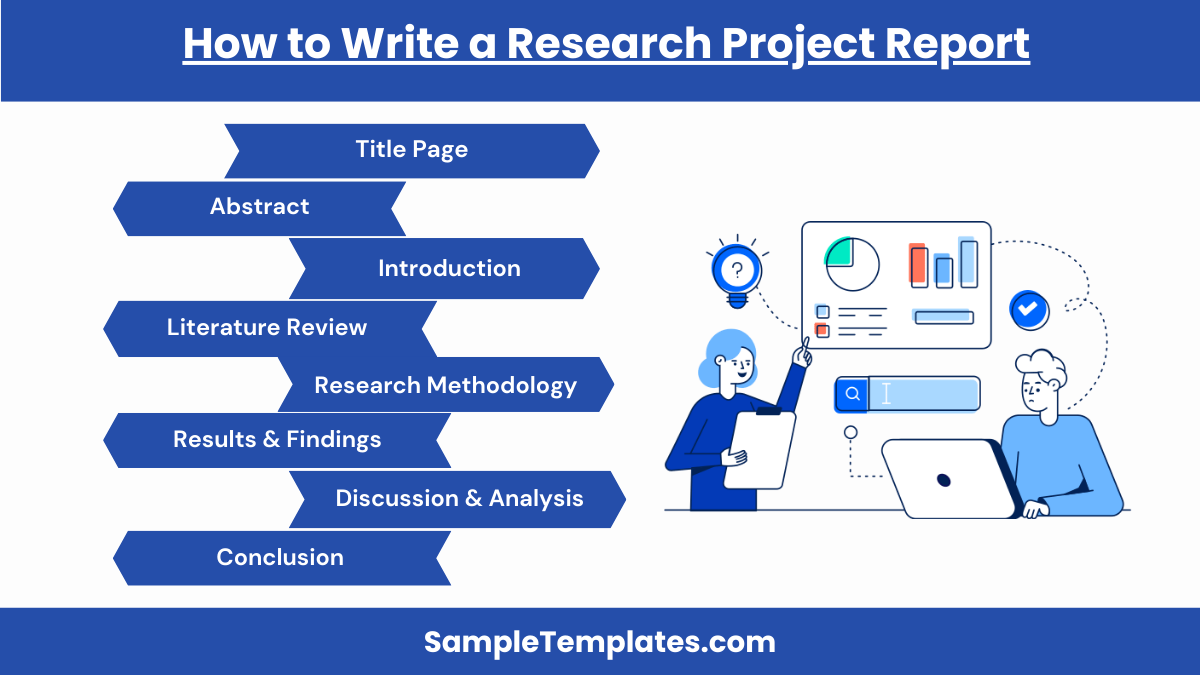
- Title Page
Include the title of your project, your name, academic institution, department, and date of submission. Ensure the title is concise and clearly reflects the focus of your research. You can also see more on Science Project Reports. - Abstract
Provide a brief summary of your research project, covering the purpose, methodology, key findings, and conclusion. This should be around 150-250 words and give readers a quick overview of the report. - Introduction
Introduce your research topic, explain its significance, and outline the research problem. Include your objectives and research questions, explaining why the study is important to the field. - Literature Review
Summarize the existing research related to your topic. Highlight key theories, concepts, and previous studies, while identifying gaps in the literature that your research addresses. - Research Methodology
Explain the methods and procedures used in your study. This section should detail the research design, data collection techniques, sampling methods, and how data was analyzed. - Results and Findings
Present the key findings from your research, using tables, charts, or graphs where necessary. Clearly explain the data and its relevance to your research questions. - Discussion and Analysis
Interpret your findings and discuss their implications. Compare your results with existing literature, addressing whether your research supports or challenges previous studies. You can also see more on Weekly Research Report. - Conclusion and Recommendations
Summarize the key points of your study, draw conclusions based on your findings, and offer recommendations for future research or practical applications. End with a reflection on the study’s limitations.
Research Project Final Report
Research Design Project Report in PDF
Writing a Project Quarterly Report for your research will require thorough attention to detail so as to make certain that you do not miss anything, and that the entire document is comprehensive. Knowing what a research project report is comprised of will help you come up with a document that is detailed, and more importantly, presentable, especially to the people you intend to show or explain it to.
Here are the essential parts that make a comprehensive project report:
- Content. The foremost component you must focus on when putting together a report on your research project is its substance. Determine and outline the information you will be including beforehand. Doing so will allow you to write the document smoothly and precisely. Write down facts you will be including, as well as other supporting information that will make your document thoroughly substantial. You can also see more on Research Analysis Report.
- Structure. This component is just as important as the substance of your project report. How you will structure and present the content of your report matters greatly in being able to convey the information you want to relay to the people who need it. Outlining how you will go about the structure of your document, while you decide on the content to include, will make writing your report easier.
Research Project Report Sample
Importance of Research Project Report
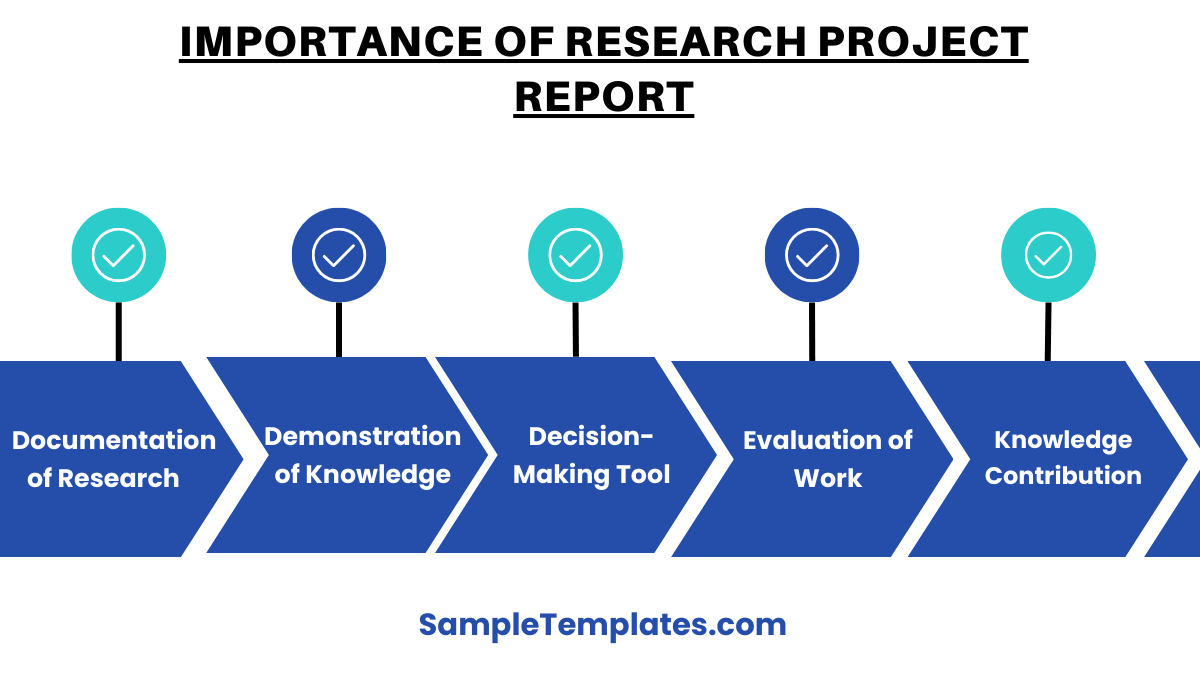
- Documentation of Research
A research project report serves as a formal record of the research process, methodology, findings, and conclusions. It helps document the research work for future reference. You can also see more on Research Status Report. - Communication of Findings
It provides a structured medium to communicate research outcomes to a wider audience, including scholars, industry professionals, and the academic community. - Demonstration of Knowledge
Writing a report demonstrates the researcher’s understanding of the topic, critical thinking, and the ability to apply research methodologies effectively. - Basis for Future Research
The report highlights gaps in current knowledge, offering recommendations for future studies. It serves as a foundation for further academic or professional investigations. - Decision-Making Tool
Research reports are often used by businesses, policymakers, and institutions to make informed decisions based on the presented data and analysis. - Evaluation of Work
For academic purposes, the research report is a tool for professors and evaluators to assess the quality and validity of the research, methodology, and conclusions drawn by the student. - Knowledge Contribution
The report adds value to the existing body of knowledge, contributing new insights, theories, or solutions to the research field. You can also see more on Primary Research Report. - Showcasing Research Skills
It provides an opportunity for the researcher to demonstrate their analytical, writing, and problem-solving skills, which are essential for academic and professional growth.
Research Project Report Example
Research Project Report for MBA
Tips For Writing a Research Project Report
- Start with a Clear Outline
Plan your report by outlining the main sections: introduction, methodology, results, discussion, and conclusion. A well-structured outline will help keep your report organized and focused. You can also see more on Short Research Report. - Be Concise and Precise
Use clear and concise language to convey your ideas. Avoid unnecessary jargon and focus on delivering information effectively. Precision in data, analysis, and conclusions is crucial. - Follow Formatting Guidelines
Adhere to the formatting rules specified by your institution or organization, including font size, margins, citation style, and structure. Consistency in format makes the report professional. - Use Visual Aids
Incorporate charts, tables, graphs, and figures to present data visually. This makes complex data easier to understand and can enhance the impact of your findings. - Cite Sources Properly
Ensure all sources, whether from books, journals, or websites, are properly cited according to the required citation style (e.g., APA, MLA, Chicago). This avoids plagiarism and gives credit to original authors. - Proofread and Revise
Review your report for grammatical errors, typos, and clarity. Take time to revise and improve your draft, ensuring it’s error-free and well-polished before submission. - Emphasize Key Findings
Highlight the most important results in your research. Ensure these are clear and directly connected to your research questions and objectives. You can also see more on Project Proposal Reports. - Conclude with Actionable Recommendations
In the conclusion, not only summarize your findings but also offer practical recommendations for future research or industry applications. This strengthens the value of your report.
Operations Research Project Report
- Visuals. By this, what is meant is how you will convert certain information in your report to graphs, tables, charts, and other visual tools so that it is better understood. Bear in mind that figures are important when it comes to any report meant to present actuarial information and data. Hence, it is recommended that you insert data visualization in your report.
- References. Creating a report involves a significant amount of information analysis. It also entails referencing the works of other people, particularly those related to your research. You will need to list down references, as well as make necessary citations to give credit to those whose works you have mentioned in your report.
Other important points of consideration when writing a project report:
- Proofreading. This task is the last step and proves to be crucial in the process of making Project Status Reports. Proofreading your work will enable you to go over it and look for any mistakes you may have made, as well as find out if there is information you left out, or if there is anything unnecessary you should take out.
- Appearance. It is also a must that you put in a little extra effort in designing the layout of your report. Aim to make it look appealing yet simple and professional.
In conclusion, the research project provided valuable insights, addressing key objectives and contributing to the field. Future studies should build on these findings to enhance understanding and application. Continued exploration is recommended for broader impact.
Related Posts
Business Report Samples & Templates
Survey Reports Samples & Templates
Sample Feasibility Reports
Psychological Assessment Report Samples [ Clinical, Child, Intake ]
Report Format Samples & Templates
Acknowledgement for Internship Report Samples [ Hotel, Hospital, Teaching ]
Field Trip Report Samples [ Agriculture, Educational, Environmental ]
Student Counseling Report Samples
Narrative Accomplishment Report Samples [ Science, Teacher, Reading ]
Sample Acknowledgment Report Templates
Internship Narrative Report Samples
Interview Summary Report Samples
Sample Medical Reports
Accomplishment Report Samples
Acknowledgement for Project Report Samples [ MBA, Engineering, Internship ]
